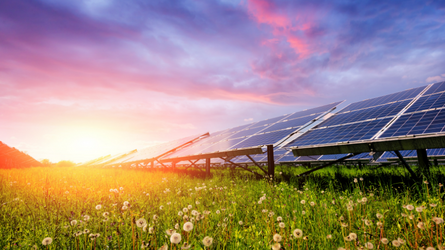The Right Thing to do is the Smart Thing to Do

No matter what you think about climate change headlines, two things are not up for debate.
- Energy prices are rising.
- Consumers and businesses are starting to look at the environmental impact of their supply chain.
The good news is, there are ways to conserve energy, lower energy bills and be a better steward of the planet. Better news? GEAPS Exchange attendees will be able to learn more about these options during an education session in Kansas City.
You might have heard from Matt Zabel, a Solution Architect with Faith Technologies Inc., at last year’s GEAPS Exchange when he spoke about energy management. He’s returning to Exchange this year to talk about using energy monitoring data to drive continuous improvement. Zabel was introduced to GEAPS by Chuck Kunisch. From the Michigan/ South Ontario chapter, Kunisch serves as First Vice President on GEAPS Board of Directors and is the Energy Efficiency Specialist at Michigan Agricultural Commodities (MAC). Kunisch has been working at MAC for about three decades. In that time, he has seen a lot of change in how grain elevators do business. Energy and labor used to be cheap. Times have changed.
About a decade ago, Kunisch set out to do something about the energy bills that seemed to be rising each month.
“I said we’re spending a lot of electricity; do we know what we’re spending it on?”
Before making robust changes, they took a hard look at what was happening, asked questions and found ways to save. Are things running when they shouldn’t be? What are the power hogs?
Are people turning equipment off when it isn’t in use? Are there better ways to do business?
“That year, we just started paying attention to what we were spending electricity on,” he explained. “Two plants. About 12 million bushels between the two. We saved $100,000 that year and continue to do that. It’s more like when you tell your kids to turn the lights off. There is a huge savings to just paying attention to how you’re using electricity now. You’ve got to know what you’ve got to correct. You need to know how you’re spending money right now.”
Knowing how to cost-effectively show where that electricity is being spent so that ways to lower your bills and conserve can be found is where Zabel excels. With the use of Energy Monitoring Systems (EMS) Zabel—and others like him—use a variety of equipment and software to give companies the data they need to not only make decisions, but to report to their consumers.
While the equipment and software, along with expert advice, takes an investment, companies will soon see savings simply by knowing what energy they’re using and how they’re using it. Not only will they save on energy usage, implementation of an EMS has shown to avoid downtime because of outages, overloads and silent equipment killers, like harmonics.
The Right Thing to Do is the Smart Thing to Do
There was a time when “going green” was considered a nice thing to do for the world. Times have changed with Environmental, Social and Governance Scores—and more changes are coming.
“As large retailers and food production companies want to increase their Environmental, Social and Governance scores, that means they have to be looking at the energy use impact of their supply chain,” Zabel said. “Fast forward some number of years in the future—we don’t know how many years—companies who provide raw materials for food products and others are going to have to report to the companies they sell to about their practices for conserving energy, reducing carbon output and protecting the environment.”
Kunisch, whose facility processes the wheat used in many foods found in our cupboards, already sees that happening. With mandates to buy green energy—wind energy comes with a bigger price tag than nuclear energy, for example—Kunisch thinks it will be more important than ever to conserve energy usage.
“Now, in the grain industry, it’s hard to make a penny and easy to lose a buck,” Kunisch said. “In the United States we export a quarter of the crops we grow—and that number is rising. Overseas is very conscious, way more than we are. If we’re going to Japan for tofu, those consumers want to know what has been done to grow those beans. It’s not just here in the United States. It’s worldwide.”
Going green is what will keep people in business going forward, Zabel surmised.
“It’s no longer an altruistic thing to be sustainable and green. For your business opportunities and business risks, you need to be looking at sustainability and conservation,” Zabel said. “In the future, customers won’t buy from you if you aren’t green. The Environmental, Social and Governance Score of a company is becoming a business need.
Someday, not today, maybe 10 years from now, Chuck might have to say ‘for every ton of white wheat stored or processed at our facility I have used this many kilowatt hours which means this many pounds of Carbon.’ Times are changing. Most companies are going to have a goal of carbon reduction, despite people’s opinions on the subject.
Kunisch agreed.
“Whether we believe we are causing climate change or not, climate change is a fact and we have got to adapt because of it,” Kunisch said.
Learn more:
GEAPS members may view Matt Zabel’s 2022 GEAPS Exchange presentation in the Video Library at geaps.com
Come to GEAPS Exchange to hear Zabel present a session on Using Energy Monitoring Data to Drive Continuous Improvement at 8 a.m. Tuesday, February 28.


Contact:

Jessica Waltzer
Communications Manager
Jessica@geaps.com
763-999-4306

